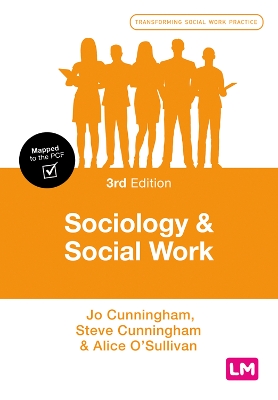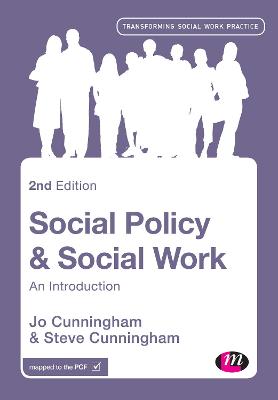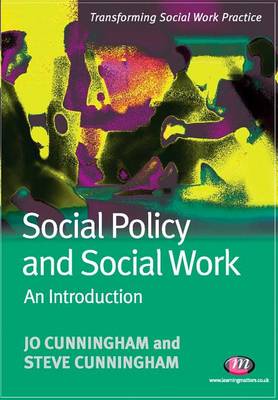Transforming Social Work Practice
3 total works
Sociology and Social Work
by Jo Cunningham, Steve Cunningham, and Alice O'Sullivan
Published 1 January 2008
Sociological perspectives can be used to analyse societal and structural influences on human behaviour at individual, group and community levels. The authors link sociological concepts, debates and theories relating to key areas such as poverty, social exclusion, education, social class and social justice to develop your students′ understanding of how sociological perspectives will impact upon their social work placements and practice.
This book begins by taking you step-by-step through the ins and outs of why sociology is important to social work. It explains the relevance of sociology to everyday social work practice, introducing you to the core sociological perspectives that you′ll need to get to grips with during your course, including functionalism, Marxism, symbolic interactionism and postmodernism. The book then moves on to explore various social issues in detail (i.e. poverty, social class, social exclusion, education, moral panics), with extended case studies, activities and links to skills in practice illustrating the many opportunities and challenges that each aspect brings to everyday practice. There are also important chapters on family, community and the role of sociology in social work training.
This book begins by taking you step-by-step through the ins and outs of why sociology is important to social work. It explains the relevance of sociology to everyday social work practice, introducing you to the core sociological perspectives that you′ll need to get to grips with during your course, including functionalism, Marxism, symbolic interactionism and postmodernism. The book then moves on to explore various social issues in detail (i.e. poverty, social class, social exclusion, education, moral panics), with extended case studies, activities and links to skills in practice illustrating the many opportunities and challenges that each aspect brings to everyday practice. There are also important chapters on family, community and the role of sociology in social work training.
An understanding of social policy is crucial for social workers as it underpins and shapes the legislative framework that they work within. From safeguarding service users and enabling them to improve their lives, to protecting the most vulnerable in society, social policy also has a vital role to play within social work education. It is important therefore for students to engage critically with social policy. This book introduces policy and shows how it has changed and evolved over time, how it reflects changes in society and how it is applied to everyday practice.
Social Policy and Social Work: An Introduction
by Jo Cunningham and Steve Cunningham
Published 7 January 2012
An understanding of social policy is crucial for social workers as it underpins and shapes the legislative framework that they work within. From safeguarding service users and enabling them to improve their lives, to protecting the most vulnerable in society, social policy also has a vital role to play within social work education. It is important therefore for students to engage critically with social policy. This book introduces policy and shows how it has changed and evolved over time, how it reflects changes in society, and how it is applied to everyday practice.


